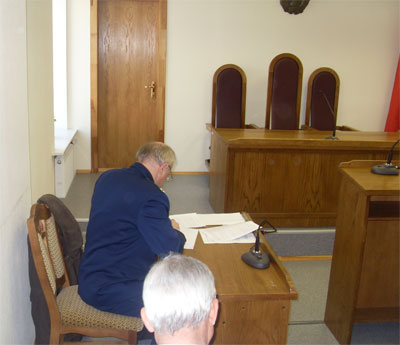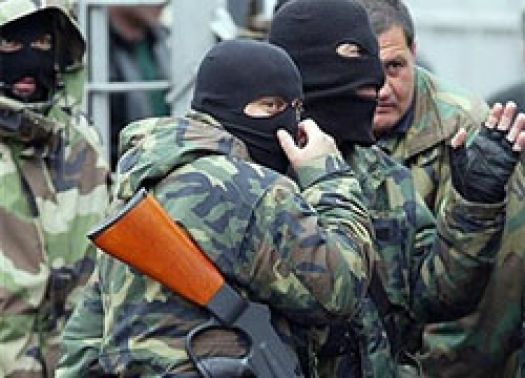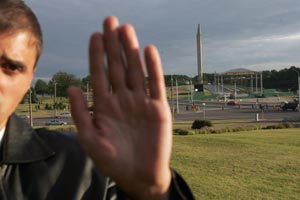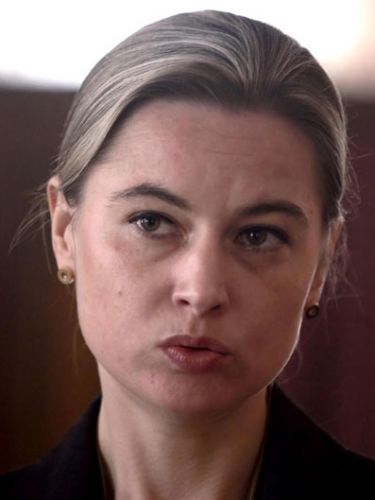On 3-14 May next year, Belarus will be subject to UPR procedure within the UN Human Rights Council. Like other countries undergoing this procedure, Belarusian officials will have to present human rights situation in the country in front of all Council members, and answer their questions.
UPR mechanism envisages a possibility for non-governmental bodies to present their own vision on human rights situation in the country, their opinion taken into account when developing final recommendations.
Both Belarusian and international NGOs are free to submit their reports.
Frequent violations
In its submission to UPR (find full version in “Documents section”,  right), ICJ states that “the Human Rights Council and its Working Group on the UPR should address the frequent violations of human rights in Belarus, including violations of freedom of expression, assembly, and association;
right), ICJ states that “the Human Rights Council and its Working Group on the UPR should address the frequent violations of human rights in Belarus, including violations of freedom of expression, assembly, and association;
violations of the right to liberty and security of person through the practice of arbitrary detention;
and violation of the right to a fair trial, in the context of executive control of the judiciary and the legal profession.
It is also essential to recall the obligation of Belarus to cooperate with international human rights mechanisms.”
Legal aid not provided
Criticising the very core of Belarusian legal and judicial system, the ICJ outlined a number of problems related to judicial independence and independence of the legal profession.
 Access to legal advice, posing a common concern for human rights defenders, was also pointed out as a problematic issue:
Access to legal advice, posing a common concern for human rights defenders, was also pointed out as a problematic issue:
“Legal aid is not provided in criminal cases, except for a suspect or a defendant’s first consultation with a lawyer; subsequent legal expenses are paid by the state but must be reimbursed by the defendant if convicted.
These restrictions have serious consequences for the right to fair trial in criminal cases and are contrary to the right to free legal assistance in criminal proceedings protected by Article 14.3.d of the ICCPR.
The Working Group should recommend that the Human Rights Council call on the Government:
• To amend the laws enabling Ministry of Justice control of the legal profession;
To restore the right of lawyers to organise self-governing independent bars;
• To ensure that lawyers practice without interference, harassment, intimidation or consequences for proper defence of clients’ interests;
• To refrain from interference with lawyer-client confidentiality;
• To ensure the right to a fair trial, as provided under international standards, including adequate legal assistance, full access to evidence used against the accused, equality of arms and observance of presumption of innocence;
• To provide to the public, media and observers effective access to trials.”
Human rights defenders harassed
ICJ reported to the UN on numerous obstacles for Belarusian human rights organizations and other NGOs: they “must register and fulfill a number of administrative requirements, which unduly hinder the exercise of freedom of association.
Activities of unregistered organizations are banned, and it is a criminal offence to organize or participate in such activities under Article 193-1 of the Criminal Code.
Furthermore, many human rights defenders face charges as a result of their monitoring elections in Belarus. NGOs that have successfully registered are nevertheless under strict supervision by the Government, especially in areas of tax and financial aid, which may even lead to the termination and dissolution of the organisation.
Such measures, which prevent associations from freely carrying out their activities, give rise to violations of the right to freedom of association as protected by Article 22 of the ICCPR.”
Make officials competent and accountable In the field of NGO and assembly freedom, according to ICJ, the UN bodies should urge the Belarusian Government:
In the field of NGO and assembly freedom, according to ICJ, the UN bodies should urge the Belarusian Government:
To amend the law to prevent the imposition of excessive or arbitrary restrictions on peaceful demonstrations, contrary to freedom of assembly as protected by Article 21 of the ICCPR (International Covenant on Civil and Political Rights);
To amend the criteria for registration of NGOs and for supervision of registered ones, so as to comply with freedom of association as protected by Article 22 of the ICCPR;
To provide appropriate training to all law enforcement officials involved in operations relating to demonstrations to ensure that they are competent to carry out their work in accordance with international human rights standards;
To fully investigate the allegations of violations of freedoms of expression, assembly and association arising from the operations by the police during the demonstrations in the aftermath of the presidential election in 2006 and hold responsible officials accountable for the violations of human rights that constitute criminal conduct;
To develop an environment conducive to the establishment and free operation of NGOs as guaranteed in the Belarus Constitution.
Let journalists do their job In media sphere, ICJ underlined that the “requirements of registration and re-registration (of media outlets – auth.) create room for abuse for political purposes. In addition, foreign journalists are often denied accreditation as under Article 35 of the Law on Mass Media any unauthorized media activity in Belarus may effectively be rendered illegal.
In media sphere, ICJ underlined that the “requirements of registration and re-registration (of media outlets – auth.) create room for abuse for political purposes. In addition, foreign journalists are often denied accreditation as under Article 35 of the Law on Mass Media any unauthorized media activity in Belarus may effectively be rendered illegal.
These measures constitute unwarranted interference with freedom of expression and further limit public access to information, in violation of Article 19.2 of the ICCPR.”
According to the experts, “the Working Group and the Council should recommend that the Government:
Repeal laws imposing undue restrictions on the right to freedom of expression, including Article 369-I of the Criminal Code on “discrediting the Republic of Belarus,” and ensure that any restrictions are provided by law and necessary to serve a legitimate purpose in accordance with Article 19.3 of the ICCPR;
Ensure that independent media have access to printing and distribution services and that journalists are protected from harassment and intimidation and can carry out their professional activities freely;
Refrain from any unlawful interference with the exercise of freedom of expression.”
UPR reinforcing the role of human rights NGOs Belarusian Helsinki Committee, Human Rights Center “Viasna”, Belarusian Association of Journalists and other national human rights organizations have also submitted a report for the procedure of UPR of Belarus within the UN Human Rights Council.
Belarusian Helsinki Committee, Human Rights Center “Viasna”, Belarusian Association of Journalists and other national human rights organizations have also submitted a report for the procedure of UPR of Belarus within the UN Human Rights Council.
The procedure of UPR made Belarusian officials more responsive to human rights defenders and resulted in them inviting NGOs “for talks” prior to UPR report submission.
 In the process of report preparation a meeting of the First Deputy Head of Administration of the President of the Republic of Belarus N. Piatkevich (right), BHC chairman A. Hulak and his vice-chairman T. Hazura, deputy-chairman of Belarusian Union of Journalists A. Bastunets, human rights defenders V. Stefanovich and U. Chavusau took place.
In the process of report preparation a meeting of the First Deputy Head of Administration of the President of the Republic of Belarus N. Piatkevich (right), BHC chairman A. Hulak and his vice-chairman T. Hazura, deputy-chairman of Belarusian Union of Journalists A. Bastunets, human rights defenders V. Stefanovich and U. Chavusau took place.
According to BHK, “at the meeting the third sector representatives expressed anxiety about the situation with human rights in the country”. Such issues, as death penalty abolition, the problem of rights for freedom of thought and peaceful meetings, freedom of associations, were discussed.
Earlier a similar meeting was held in the Ministry of Foreign Affairs of the Republic of Belarus.
New mechanism
Universal Periodical Review (UPR), which Belarus is preparing for, is a new mechanism within the UN Human Rights Council.
It is a unique process which involves a review of the human rights records of all 192 UN Member States once every four years.
 The UPR is a State-driven process, under the auspices of the Human Rights Council, which provides the opportunity for each State to declare what actions they have taken to improve the human rights situations in their countries and to fulfil their human rights obligations. As one of the main features of the Council, the UPR is designed to ensure equal treatment for every country when their human rights situations are assessed.
The UPR is a State-driven process, under the auspices of the Human Rights Council, which provides the opportunity for each State to declare what actions they have taken to improve the human rights situations in their countries and to fulfil their human rights obligations. As one of the main features of the Council, the UPR is designed to ensure equal treatment for every country when their human rights situations are assessed.
The UPR was created through the UN General Assembly on 15 March 2006 by resolution 60/251, which established the Human Rights Council itself. It is a cooperative process which, by 2011, will have reviewed the human rights records of every country.
Currently, no other universal mechanism of this kind exists. The UPR is one of the key elements of the new Council which reminds States of their responsibility to fully respect and implement all human rights and fundamental freedoms. The ultimate aim of this new mechanism is to improve the human rights situation in all countries and address human rights violations wherever they occur.
Documents:


